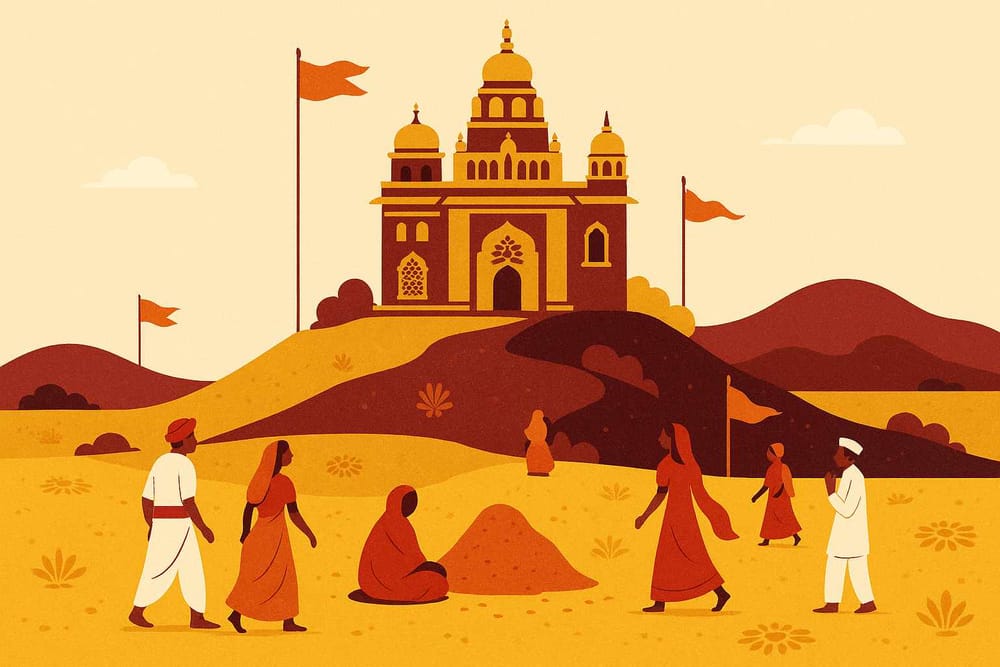
Exploring 'Jejuri' by Arun Kolatkar: Themes and Imagery Explained
Have you ever stood in a holy place and felt like an outsider? A place where the air is thick with centuries of faith, yet your own heart is filled with questions? It's a feeling many of us in modern India know well—the gentle tug-of-war between the traditions we inherit and the logic we live by. This very conflict, this beautiful confusion, is the soul of Arun Kolatkar's masterpiece, Jejuri.
This isn't just a collection of poems; it's a journey. It’s like hopping on a state transport bus on a dusty afternoon, with the destination being the temple town of Jejuri in Maharashtra, the sacred home of the deity Khandoba. But Kolatkar isn't just a pilgrim; he's an observer with a modern, almost skeptical eye. Through his words, we don't just see a temple; we see a world where faith and decay, divinity and commerce, live side-by-side, creating a uniquely Indian experience.
A Journey Through Faith, Doubt, and Everything in Between
Reading Jejuri feels less like studying poetry and more like walking through the temple grounds yourself. Kolatkar’s genius lies in how he uses simple, almost stark language to paint pictures that are brimming with meaning. His style is unconventional, catching the chaotic, beautiful essence of life where myth and modernity collide. Let's walk through the key feelings and ideas that make this work so timeless.
- The Quiet Battle of Faith and Skepticism: The narrator in the poems isn't a devout believer blindly accepting every ritual. He questions things. He looks at a crumbling temple wall and wonders about the faith that built it and the neglect that lets it fall apart. This is the voice of the modern Indian—respectful of the past, but unable to switch off the questioning mind. It’s a profound look at how spirituality isn't always about answers, but sometimes about living with the questions.
- When God and Commerce Meet: Any visit to a pilgrimage site in India is incomplete without the bustling market that surrounds it. Kolatkar doesn't shy away from this. He observes the vendors selling turmeric and religious souvenirs, showing how devotion has a transactional side. He doesn't judge it; he simply presents it, making us think about how faith adapts and survives in the real world. It’s a powerful commentary on the commercialisation of religion, a sight familiar to anyone who has navigated the lanes of a temple town.
- Mythology in Daily Life: The god Khandoba isn't a distant, abstract deity in these poems. He is a living presence, woven into the fabric of everyday life, into the stories the priests tell and the beliefs the pilgrims hold. Kolatkar masterfully shows how ancient myths are not just stories from the past but are alive and breathing in the present, shaping the lives of ordinary people. It’s a beautiful reminder of how our gods walk among us.
- The Feeling of Being an Outsider: Throughout the poetic journey, there's a sense of alienation. The narrator is part of the crowd, yet separate from it. He observes the rituals but doesn't fully participate. This feeling of being caught between two worlds—the ancient and the modern, the faithful and the skeptical—is what makes Jejuri so relatable. It captures the essence of a spiritual quest in an age of doubt, a journey many of us are on.
Why Does 'Jejuri' Still Speak to Us?
Decades after it was written, Jejuri remains incredibly relevant. It’s because the poem gives voice to a uniquely Indian spiritual identity—one that is complex, questioning, and deeply personal. It reminds us that faith isn't a single, perfect thing. It can be found in a grand temple, in a crumbling stone, or in the simple act of observing the world with an open heart.
The journey Kolatkar takes us on is not just to a physical place. Much like a pilgrimage to Pushkar's sacred ghats or the divine corners of Udaipur's holy sites, it is an inner journey. It’s a pilgrimage into the landscape of one's own beliefs. The poem holds a mirror up to our society, reflecting our deep-rooted traditions and our modern-day dilemmas.
Kolatkar's work is a testament to the fact that you don't have to be a staunch believer to appreciate spirituality. Sometimes, the most profound connection comes from a place of honest questioning. This is a journey every thinking, feeling person can relate to.
Finding Your Own Spiritual Connection
Exploring texts like Jejuri helps us understand our own culture and faith on a deeper level. It’s a conversation starter, a piece of art that makes you pause and reflect. At Bhaktilipi, we believe in making these timeless conversations accessible to everyone. We are dedicated to preserving and sharing the rich tapestry of devotional literature that shapes our identity.
If Kolatkar's exploration of faith and tradition resonates with you, we invite you to explore more with us. From ancient scriptures to modern reflections, our platform is a space to connect with the stories that bind us. Join the Bhaktilipi family and continue your journey into the heart of India's spiritual wisdom.
Subscribe to our newsletter or follow us on social media to stay connected. Let’s explore the many shades of devotion together.
A Final Thought on a Modern Epic
Is Jejuri a critique of religion? Or a celebration of it? Perhaps it's both. More importantly, it is an honest and unflinching look at the human experience of faith. In its own quiet way, Jejuri can be considered a modern epic—not of gods and heroes in a mythical age, but of an ordinary person trying to find meaning in a world where the sacred and the mundane are beautifully,chaotically intertwined. It’s a poem that doesn't give you easy answers but leaves you with a richer understanding of the questions themselves.
A passionate group of people dedicated to preserving India's knowledge of Dharma, Karma, and Bhakti for ourselves and the world 🙏.
